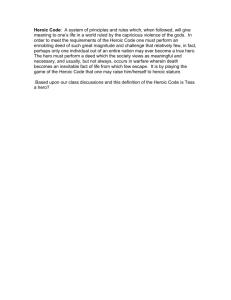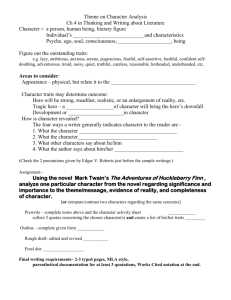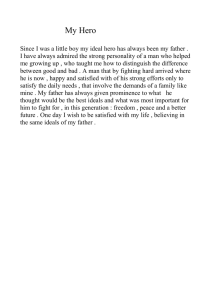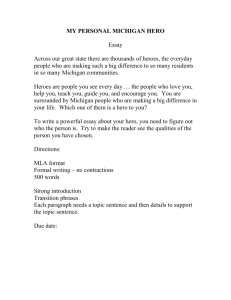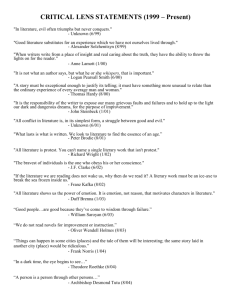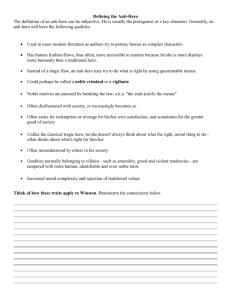The Hero in Literature
advertisement
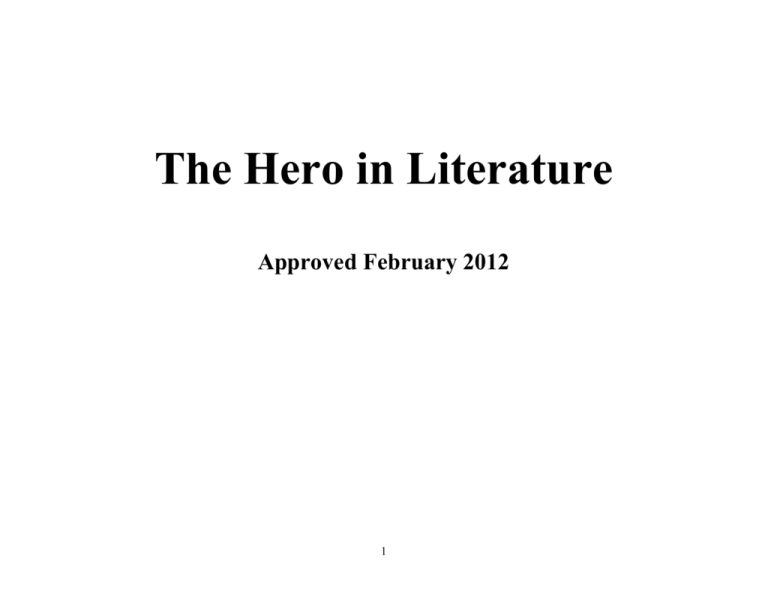
The Hero in Literature Approved February 2012 1 Essential Understandings: 1. The development of reading and speaking vocabulary is essential to literacy. 2. A variety of strategies can be used to promote comprehension 3. Reading fluency is essential to comprehension. 4. Reading develops when students are engaged with meaningful text 5. Literary devices and conventions help to engage the reader in the text 6. Readers respond to literature in many ways. 7. Literature helps to shape human thought. 8. Authors and readers are influenced by their individual, social, cultural and historical contexts 9. Speaking and listening skills are necessary for effective communication. 10. Different types of writing are used to communicate ideas to a variety of audiences for a variety of purposes. 11. Research skills are used to make meaning from a variety of sources to answer questions and explore interests. 12. Culture affects the way language is used. 13. Rules of punctuation, capitalization, and usage must be applied for effective communication. 14. Correct sentence structure is necessary for effective communication 15. Appropriate word choice improves communication. Content Standards: 1. Students read, comprehend, and respond in individual, literal, critical and evaluative ways to literary, informational, and persuasive texts in multimedia formats. 2. Students read and respond to classical and contemporary texts from many cultures and literary periods. 3. Students produce written, oral, and visual texts to express, develop, and substantiate ideas and expressions. 4. Students apply the conventions of standard written English in oral, written, and visual communication. 2 The Anti-Hero Essential Question: What is an anti-hero? Learning Goals: Students will: Identify and understand Northrop Frye’s five essential types of heroes: the Super man; the Supreme Man, the Leader, the Common Man, and the Lowly Man Understand that a hero, in contrast to the anti-hero, acts out of his commitment to some system of values (religious, moral and or political) Identify, define, and understand the anti-hero as a person or literary character who does not embody any particular value system except his own private one; a contemptible character Suggested Strategies Suggested Assessments Suggested Resources Suggested Tech Integration Content Vocabulary Lifelong Learning/21st Century Skills Compare the characteristics of the protagonist to the Northrop Frye’s essential hero characteristics to reveal the discrepancies about “the hero.” Examine the traits that are odd or indicative of the anti-heroic behavior. Film: Simon Birch Suggested short readings: o A&P o Thank-you Ma’am o Moon Face o To Build a Fire the Super man; the Supreme Man, the Leader, the Common Man, and the Lowly Man. Produce quality work Access and process information responsibly, legally, and ethically Read critically for a variety of purposes Communicate for a variety of purposes and audiences Demonstrate productive habits of mind Adhere to core ethical values 3 The Archetypal Hero Essential Question: What is an archetypal hero? Learning Goals: Students will: Identify the characteristics valued by the Greek society: loyalty, physical strength; hospitality, mental superiority, justice and revenge, the proper behavior and abilities of women, the role of the gods in man’s life Understand Joseph Campbell’s concept and stages of the heroic journey Identify the stages of Joseph Campbell’s journey or pattern of the quest: the call, the threshold; the refusal; the challenges; the abyss; the transformation; the revelation; the atonement; the return; the boon; the mentors Understand the romantic hero as defined by Northrop Frye Identify Frye’s stages of advent, initiation, journey, descent into darkness/apotheosis 4 Suggested Strategies Suggested Assessments Suggested Resources Suggested Tech Integration Content Vocabulary Lifelong Learning/21st Century Skills Apply the understanding of the stages of the journey to other literature and film Identify the heroic journey in other literature Films: o The Odyssey (adapted) o Jason and the Argonauts o Hercules (the myth) Texts: o The Old Man and the Sea o “By the Waters of Babylon” Produce quality work Access and process information responsibly, legally, and ethically Read critically for a variety of purposes Communicate for a variety of purposes and audiences Demonstrate productive habits of mind Adhere to core ethical values 5 Contemporary Hero Essential Question: How has the hero emerged in contemporary literature? Learning Goals: Students will: Identify and understand the seven elements of fiction: plot, point of view, setting, conflict, characters, tone, and theme Understand impact of moral convictions, personal values, and integrity on heroic characters Understand impact of setting and time-period on heroic characters Understand Kohlberg’s levels of moral development to a variety of characters Suggested Strategies Suggested Assessments Suggested Resources Suggested Tech Integration Content Vocabulary Lifelong Learning/21st Century Skills Create a personal definition of a hero Create a memory box reflecting a character in a contemporary novel or story Create a “Life’s Little Instruction Booklet” reflecting personal values of a character in a contemporary novel or story apply Kohlberg’s levels of moral development to a variety of characters from literature or film Use appropriate rubrics Film: We Were Soldiers Produce quality work Access and process information responsibly, legally, and ethically Read critically for a variety of purposes Communicate for a variety of purposes and audiences Demonstrate productive habits of mind Adhere to core ethical values 6 War Heroes Essential Question: How does war affect our concept of the hero? Learning Goals: Students will: Identify and understand the ambiguous characteristics of a SOLDIER: bravery, courage, sacrifice, fear, cowardice, duty, honor, survival Understand the trials and tribulations of PRISONERS OF WAR during the Vietnam conflict: disregard for human dignity; need for communication; fear of thinking about the future; survival - individual breaking points, code of honor; prison camp conditions Understand the home front perspective: spouses and families of soldiers, challenges of raising families, lack of knowledge about their spouses conditions, Understand how the residual effects of the war create everyday heroes on the home front 7 Suggested Strategies Suggested Assessments Suggested Resources Suggested Tech Integration Films: Content Vocabulary Lifelong Learning/21st Century Skills Create a personal Code of Conduct American Experience: Return with Honor (DVD) Regret to Inform (DVD) Born on the Fourth of July Platoon Apocalypse Now Coming Home We Were Soldiers CRHS Blog Site www.thewall-usa.com www.pbs.org/wgbh/amex/honor/filmmore/fd.html Produce quality work Access and process information responsibly, legally, and ethically Read critically for a variety of purposes Communicate for a variety of purposes and audiences Demonstrate productive habits of mind Adhere to core ethical values 8



